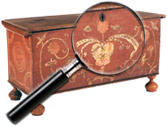Frank L. Horton
The co-founder of the Museum of Early Southern Decorative Arts (MESDA) and a major contributor to the planning and restoration of Old Salem, the living history museum in Winston-Salem, North Carolina, Frank L. Horton passed away February 21, 2004. He was 85 years old.
The enormous impact that Horton made on the field of antiques is readily acknowledged by American decorative arts scholars. His contributions to historic preservation are easily recognized by the tens of thousands of annual visitors to Old Salem. With achievements ranging from the restoration of an 18th-century town amidst a 21st-century city to a pioneering program that established a world-class research center, Frank Horton’s greatest legacy may be in convincing the rest of the world that the decorative arts of the early South are just as worthy as those made in Philadelphia, New York, or Boston.
Born in Raleigh in 1918, to Theodosia Horton Taliaferro and Dr. Miles Horton, Frank Horton was raised in Winston-Salem. He graduated from R.J. Reynolds High School in 1935 and attended the Augusta Military Academy in Fort Defiance, Virginia, and the New Mexico Military Institute in Roswell, New Mexico, before attending Pace Institute (now Pace University) in New York City where he studied business. In 1942 Horton enlisted in the Navy and served aboard the USS Sturtevant, a destroyer escort ship, and saw duty in both the Atlantic and Pacific theaters during World War II.
Horton had enjoyed collecting from an early age, and his passion for antiques paved the road for his future businesses. By 1947 he had returned to Winston-Salem and opened an antique shop with his mother. They became two of the first dealers to specialize in southern antiques during a time when most dealers believed that no decorative arts of merit were made in the South. Horton’s passion for furniture soon led him to research historical architecture and subsequently to the Archives of the Moravian Church (Southern Province) in Winston-Salem.
In 1948, Horton began to absorb the Moravian archives’ copious records in an effort to explore every possible facet of Salem’s architectural history. The town of Salem was established in 1766 by Moravian settlers from Pennsylvania and became an important trade and cultural center of backcountry North Carolina. This research into Moravian architecture and the town of Salem proved vital when Horton was asked by the City of Winston-Salem to assist in assessing the feasibility of restoring the historic town. Horton’s research findings made it possible to create an inventory of the historic buildings still standing in Old Salem and to make a list of old buildings that might be reconstructed: in other words, the crucial data that created the vision of what Old Salem would become. When Old Salem Inc. was established in May 1950, Horton was hired as the organization’s first director of restoration. He held this post without pay for over 20 years, supervising the restoration of more than 40 buildings and the removal of more than 100 non-conforming structures in Old Salem.
Horton’s trips into the field searching for southern antiques soon shared the goal of finding furnishings for Old Salem’s exhibit buildings. In 1960 he and his mother donated their collection of southern decorative arts to Old Salem Inc. and contributed funds for the renovation of a building in the historic district for use as a museum. MESDA, co-founded by Horton and his mother, opened its doors for the first time in 1965. MESDA is the only museum in the world dedicated to early southern decorative arts. The museum collects, exhibits, and studies southern decorative arts dating from the 1600′s to 1820 in twenty-four period rooms and six galleries. The collection includes furniture, silver and other metals, textiles, ceramics, and visual arts from Maryland, Virginia, the Carolinas, Georgia, eastern Kentucky, and eastern Tennessee.
In 1972, Horton asked to be relieved of his duties as Old Salem director of restoration and became full-time director of MESDA. Also in 1972, he designed and led an unparalleled field research program, documenting over 15,000 objects of early southern decorative arts in southern homes. This internationally acclaimed field research program took museum representatives into more than 11,000 homes, and continued through 1985. Today, MESDA researchers continue a second component of Horton’s program by scouring newspapers, city directories, personal papers, and court records, having already documented over seventy-five thousand artisans working in the South before 1821. In 1988 Horton retired from his position as director of MESDA and was made director emeritus of the museum. He worked actively in the documentary research program until moving to a retirement home in 2001.
Despite being diagnosed with Parkinson’s disease, Horton remained active as an advisor to the MESDA collection until his death. An author of numerous articles on southern decorative arts, he was also instrumental in establishing MESDA’s award-winning Journal of Early Southern Decorative Arts (published twice annually) and the museum’s acclaimed Frank L. Horton Series of Decorative Arts Monographs. Horton’s life story, written by renowned biographer Penelope Niven, was published in the Summer 2001 issue of the Journal of Early Southern Decorative Arts . During his lifetime, Horton was awarded many honors for his contributions to the fields of historic preservation and American decorative arts. Among his notable awards are the Louise du Pont Crowninshield Award in 1970 by the National Trust for Historic Preservation for achievement in the preservation and interpretation of significant historic and cultural treasures; the Henry Francis duPont Award in 1989 for distinguished contributions to the American arts (awarded by the Winterthur Museum); and the North Carolina Award in Fine Arts in 1999, the most distinguished award presented by the State of North Carolina. Horton was awarded an honorary Doctor of Humanities in 1995 by Wake Forest University. In 1997 Old Salem Inc. named its new museum complex in Horton’s honor. The Frank L. Horton Museum Center now houses MESDA, the Old Salem Toy Museum, and the Old Salem Children’s Museum.
This biographical note courtesy of Charlton Hall Auctions.
